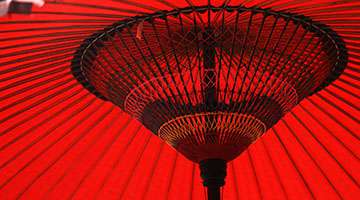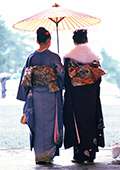


JAPANESE CUSTOMS, MANNERS and ETTIQUETTE
Japan has many customs and manners that might differ from what you do at home. Below is a list of some that one should keep in mind:
![]()

WHEN MEETING FIRST TIME
The formal greeting when meeting the first time is - 'Hajimemashite, Yoroshiku onegaishimas' followed by a bow. The phrase translates to mean 'It's the first time meeting. Please treat me well.'
• Bowing is more common than handshaking when meeting; one's back should be straight, and eyes lowered.
• The deeper and longer the bow, the more sincere and respectful.
• Women sometimes clasp their hands in front when bowing.
• At business meetings, there is an exchange of business cards - 'meishi'. One's own meishi should be presented with both hands held toward the receiver. Receiving meishi should also be done with both hands, and the card should be placed on the table face upward. The receiver should also look closely at the given meishi, and if possible make a respectful remark about the company, address or the business card itself.

Japanese cuisine is varied and delicious and anyone visiting Japan should take advantage of the many different dishes available. Keep in the mind the following and you will be okay.
• At restaurants, after ordering, use the hand towel to wipe hands.
• Before starting a meal, clasp hands together and say, 'Itadakimas' - which translates as 'I humbly receive'.
• Chew food with a closed mouth - though slurping Japanese noodles is considered okay.
• Pour soy sauce into small dish provided, and not directly onto rice.
• Passing food from chopsticks to chopstick is considered rude - place food on plate and pass the plate.
• Do not stick chopsticks vertically into a bowl of rice as it is similar to a funeral rite.

Anyone may visit a Buddhist Temple or a Shinto Shrine, but there are some basic rules to keep in mind:
• Before entering the main part, rinse hands and mouth at the water fountain near entrance
• Photos are usually ok, but don't take photos of prayer area
• If making a prayer, start by tossing a coin into prayer box

Onsens, hot springs, and public baths have a long history in Japan. The baths are used for soaking and not for washing. All washing and rinsing should be done before entering the pools.
• First wash then thoroughly rinse at the seated showers
• After soaking a bit in bath, wash and rinse again
• No Splashing or fooling around is allowed

• Restrooms slippers will sometimes be provided. Leave your shoes at the door and use the slippers within the restroom.
• There are usually two flush options on the toilet handle - 'Big' and 'Small'

An invitation to a person's house is a mark of honor.
• Be respectful and punctual.
• Bring a small gift or wrapped food.
• Remove shoes at the entry way, and use the house slippers if provided.











